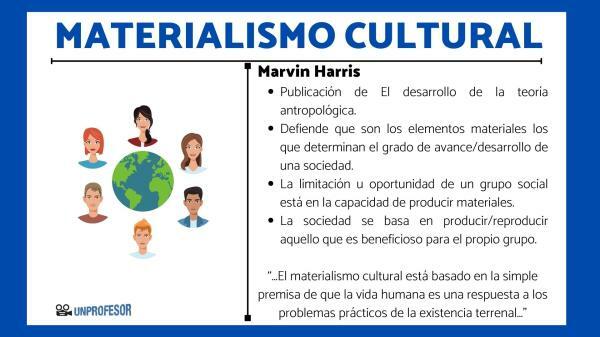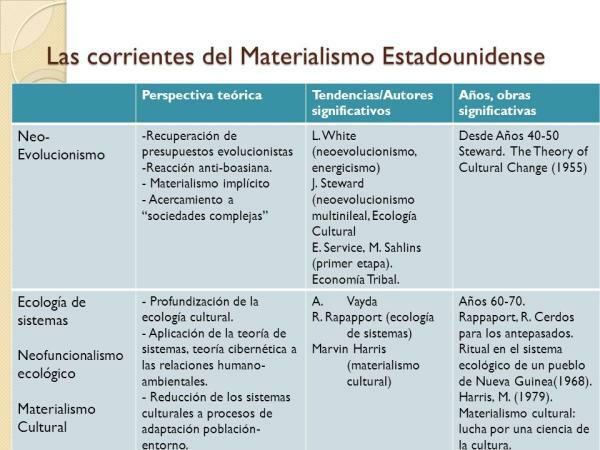CULTURAL Materialism by Marvin Harris – SUMMARY to study!

In today's lesson we are going to talk about one of the most important American anthropologists of the 20th century, Marvin Harris (1927-2001). Father of cultural materialism, which is based on the marxist materialism and in the theories of cultural ecology /cultural evolution of Julian Steward and Leslie White.
Cultural materialism was born in 1968 with the publication of the book The development of anthropological theory. Where Harris defends the understanding of ideas as an expression of a material basis for understanding society and where he distinguishes between three categories or sociocultural forms: Infrastructure, structure and superstructure.
If you want to know more about the cultural materialism of marvin harris, keep reading this article by a TEACHER Let the class begin!
To fully understand cultural materialism, you first need to understand what theories it is based on. In this way, we can highlight the theory of ecology/cultural evolution of two authors on whom Marvin Harris leaned to develop materialism cultural:
- Julian Stewart: In 1955, he published Theory of Culture Change: The Methodology of Multilinear Evolution, where it is stated that cultural change occurs as a function of adaptation to the environment by a group. Thus, Sterward tells us of the multilinear evolutionism or cultural diversification (diversity and local variations) depending on the adaptation to the environment by different communities at the same historical moment. For example, while in 2500 a. c. in Egypt the pyramids were being built, in the Iberian Peninsula they were in the Age of metals or learning the techniques of melting metals.
- Leslie White: In 1959, White published The evolution of culture: the development of civilization to the fall to Rome, where he states that a culture is made up of three levels or components: ideological, sociological and technological. Of these three, the level that has a preponderant role is the technological one, since it is the one that determines the level of development of a culture. That is, the creation of mechanical means (technology) by man to adapt to the natural environment. Thus, a culture with more means will be more evolved than one that does not, giving rise to different societies depending on their level of technology.

Image: Slideplayer
With the publication of The development of anthropological theory, Marvin Harris defined one of the most important anthropological research trends of the 20th century, the cultural materialism. Which, he defends that they are the material elements that determine the degree of progress/development of a society, that is, the limitation or opportunity of a social group is in the ability to produce materials (technology, tools, food...) to meet their own needs and to be able to reproduce. As Harris himself would say:
“…Cultural materialism is based on the simple premise that human life is a response to the practical problems of earthly existence…”
In this way, society is based on produce/play what is beneficial for the group itself. For example, if a system of government is beneficial for a society, it will be maintained over time, but if it is not, it will end up disappearing or will cease to exist within said society because it is not beneficial. Therefore, a society ends up developing and building through trial and error.
Categories of cultural materialism
On the other hand, our protagonist also establishes three categories (which feed each other), sociocultural systems or forms of society:
- Infrastructure: It is the most basic category of all, it is the foundation of the other two categories and its main function is meet basic needs of the society. Also, it is divided into production (the technology used and the way in which the group obtains resources from the environment) and reproduction (demographic, economic, environmental and technological variables).
- Structure: It is a category in which a greater social complexity can be glimpsed and it is the one that is directly related to the economic organization (domestic and community)/politics and the economic/political interactions between different societies. At this level the anthropologist must study (from the particular to the general) the relationships between the members of the community, the economic/political structure, the roles of individuals, hierarchies, the distribution of functions…
- Superstructure: It is the most complex level of the three and is based on the previous two. This category includes ideas, symbols, rituals, food taboos (based on rational reasons = depending on the economic and ecological conditions of a place), games, religion and symbolic values that a group uses. Therefore, the anthropologist here must analyze the ideology/thinking of the group.
In short, Marvin Harris explains to us the cultural organization, the ideology and the symbolism within the materialist framework of infrastructure, structure and superstructure.

Another of the most important contributions of Harris was the method of analysis to interpret a cultural reality through participant observation and that is based on the concepts or perspectivesemic/ethic:
- Emic: It describes the cultural reality and behavior from the point of view of the individuals that make up said culture (specific scope). Namely, from inside.
- ethics: Describes the cultural reality and behavior from the point of view of a person outside that culture (external and universal scope). Namely, from outside, an analysis by a historian, anthropologist, or sociologist.
Thus, with the emic-etic perspective, one seeks contrast two minds, that of the subject and that of the observer, so that the second (observer) can come to interpret not only from the etic but also be able to understand from the emic. For this reason, from the 1960s onwards, from social anthropology the objective was to delve deeper into the study and analysis from an emic perspective or from the inside, since that is the only way it can be understood the reason for a custom (intention, motivation, objective...) 100%.
Harris, Marvin (1998). The development of anthropological theory. History of theories of culture. XXI Century of Spain Publishers



